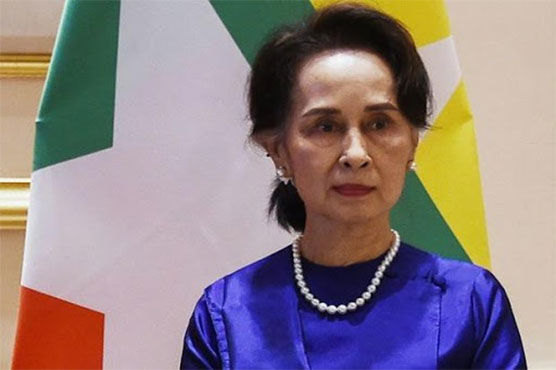Myanmar junta says Suu Kyi broke secrets law, Britain ramps up sanctions

Aung San Suu Kyi has been accused of breaking a colonial-era official secrets law.
YANGON (AFP) - Myanmar s ousted civilian leader Aung San Suu Kyi has been accused of breaking a colonial-era official secrets law, her lawyer said Thursday, as former colonial power Britain ramped up sanctions against the junta.
The newly unveiled charge came amid growing international outrage over the February 1 coup and the military s subsequent clampdown on protesters that has left at least 535 people dead.
Internet service providers were ordered to shut down Myanmar s wireless services, provider Ooredoo said Thursday, in the latest move to suppress communication.
Britain announced sanctions on the Myanmar Economic Corporation (MEC), a conglomerate controlled by the military that Washington has already blacklisted.
International powers have sought to pile pressure on the military by hitting its sprawling business interests, which include the country s lucrative jade and ruby trade.
Earlier, Suu Kyi appeared by video link in court in the capital Naypyidaw, where she faces a raft of charges that could see her barred from political office.
The hearing dealt with administrative aspects of the case including the formal appointment of eight defence lawyers.
"Daw Aung San Suu Kyi s physical condition was good according to the (lawyer who saw her on screen). She was smart and charming as always," lawyer Khin Maung Zaw told reporters.
He later told AFP that the Nobel laureate has been accused of breaking an official secrets law in a lawsuit filed March 25.
Meanwhile at the United Nations, member states issued a statement denouncing Myanmar s internet shutdowns and attacks on freedom of expression.
The statement, signed by dozens of countries, expressed "deep concern" over the plight of journalists and media workers since the military seized power.
- Wanton killing -
In addition to sanctions, London will also stump up $700,000 towards UN Security Council efforts to document serious human rights violations in Myanmar.
"Two months on from the start of the coup, the Myanmar military has sunk to a new low with the wanton killing of innocent people, including children," British foreign minister Dominic Raab said in a statement.
The measures would hit one of the military s "key funding streams", he added.
A group of ousted MPs from Suu Kyi s National League for Democracy (NLD), who have been working underground against the junta, have announced plans for "a new civilian government" in the first week of April.
They said Myanmar s military-drafted 2008 constitution was "cancelled", and on Thursday a group of protesters burned a pile of copies in the street in Yangon.
In another blow to the junta s business interests, two military-owned supermarkets in Yangon were set ablaze overnight, and more international companies cut ties.
German company Giesecke+Devrient, which supplies raw materials to Myanmar s central bank for the production of banknotes, announced Wednesday it was suspending deliveries.
French renewable energy giant Voltalia said it was also withdrawing from the country because of the political and humanitarian crisis.
Protests -- and the security forces tough response -- continue, and in Monywa in central Myanmar on Thursday a 31-year-old protester was shot dead, while 10 others were wounded, a rescue worker told AFP.
One person was also killed, and six others injured, in Mandalay, a rescue worker and a doctor said.
And the International Federation of Red Cross and Red Crescent Societies said security forces had been targeting first responders.
"Myanmar Red Cross first aiders and medics have been wrongfully arrested, intimidated or injured and Red Cross property and ambulances have been damaged. This is unacceptable," Asia-Pacific director Alexander Matheou said.
The UN Security Council held an urgent closed-door session on the escalating crisis on Wednesday, where special envoy on Myanmar Christine Schraner Burgener urged it to act.
Britain s UN envoy Barbara Woodward said the Security Council was "united in its condemnation" and was discussing "a range of measures at our disposal", but China ruled out sanctions or other "coercive measures".
- Civil war fears -
Fears are also growing that a broader conflict could erupt in a country plagued for decades by on-off fighting between the military and rebel ethnic armies.
Several of Myanmar s 20 or so armed ethnic groups, who control large areas of territory mostly in border regions, have voiced their opposition to the coup and crackdown.
Three of them -- the Ta ang National Liberation Army, the Myanmar Nationalities Democratic Alliance Army and the Arakan Army -- on Wednesday threatened to join the protesters fight against the military.
Two other outfits -- the Karen National Union (KNU) and the Kachin Independence Army (KIA) -- have already stepped up attacks on military and police in recent days.
In another escalation, since Saturday the military has launched regular air strikes targeting the KNU in eastern Karen state.
Local media outlet Karen News reported that 11 people were killed in an air strike in a gold mining area of the state on Tuesday. AFP has yet to independently confirm these details.

